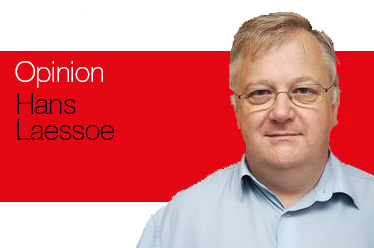International co-operation against money laundering and terrorist financing is only as strong as its weakest link, writes, Muhammad Chamaa, Nest’s group compliance officer
Last month the UK government published its latest national risk assessment into money laundering and terrorist financing – its first since 2015. The assessment provides a “critical component of the evidence base for the response to money laundering and terrorist financing over the coming year.”
It also comes ahead of the UK’s anti-money laundering/counter-terrorism financing (AML / CTF) audit by the Financial Action Task Force (FATF), the independent inter-governmental body responsible for promoting AML/CTF global policy, which is due to take place in 2018.
Money laundering and terrorist financing are relentless threats. The criminal network that lies beneath impacts on all levels of society – from the state to the individual.
The UK and the US are amongst the world’s largest and most open economies. AML and CTF regulations are enforced by well-funded and highly vigilant regulatory, investigative and prosecutorial authorities, such as the SFO, FCA and NCA in the UK and FinCEN, the SEC and the DOJ in US.
However, the size and sophistication of these economies, plus the ubiquitous nature of the US-dollar, makes them particularly vulnerable to abuse by foreign criminals. Regulatory loopholes are constantly exploited. The Paradise Papers have revealed how easily money can be moved and held overseas in opaque corporate structures away from regulatory scrutiny. Money is channelled from emerging markets, often via these island tax-havens, by criminals needing to clean their cash or ill-gotten gains, finance terrorism or prop up corrupt regimes through a correspondent banking service in a stable financial system.
“AML isn’t just a regulatory issue; it is a national security concern… Criminals, terrorists, and drugs, weapons and human traffickers—that’s who benefit when we aren’t doing our best to combat money-laundering activity” – Susan Axelrod, Executive Vice President of Operations at the US Financial Industry Regulatory Authority
The US paradox
On 3 February 2017, President Trump signed an executive order aimed at de-regulating the financial system in favour of American interests. The message behind the executive order was Trump’s own – ‘America first.’
Echoing President Trump’s calls for de-regulation, many in the US banking sector immediately called for a complete overhaul of how financial institutions investigate and report criminal activity. In a report published by The Clearing House on 16 February 2017 and called “A New Paradigm”, the largest US banks, including JP Morgan, Bank of America and Citigroup, argued that current regulations have limited AML/CTF benefit and harm US strategic influence in emerging markets and financial inclusion.
On the other hand, some AML/CTF observers have balked at the suggestion that regulations in the US could be loosened. “I have concerns with the banks even doing what they are supposed to do now,” said Heather Lowe, director of government affairs at Global Financial Integrity – an organisation that pushes for stricter money-laundering enforcement.
Emerging markets – facing the ever-changing compliance burden
It is essential to consider the same issue from the perspective of emerging economies wanting to trade in regulated markets. In a recent study by the International Finance Corporation, their emerging market banking clients reported spending large amounts of money constantly up-grading their services, hiring more staff and improving software to deal with the compliance burden imposed upon them. Many had been forced to reduce their essential offerings to customers and now found it hard or impossible to facilitate cross-border transactions.
This is a direct cost of dynamic compliance obligations and variations in how regulators implement the global regulatory framework proscribed by the FATF. It is not only the amount of regulation across jurisdictions but also managing regulatory change.
The burdensome global regulatory landscape is therefore stifling business and entrepreneurship in vibrant emerging markets. It impacts entire countries by removing their financial lifeline to wider markets. High-risk markets, already seen as pariah economies by their western counterparts, face complete exclusion from the global market-place. This inhibits growth and development, and creates a system more vulnerable to exploitation by criminals and money-launderers, thus perpetuating the problem.
Writing for the Financial Times, Philippe Le Houérou, chief executive of the International Finance Corporation, summarised the problem, “For emerging market banks themselves, the challenges are so significant that there is a risk of throwing the baby out with the bathwater.”
The revolutionary role of Blockchain technology in international regulation and compliance
KYC is an integral part of the AML/CTF framework but has historically been a non-digital and often flawed process. There is an inherent information imbalance that creates additional compliance risk for banks, particularly those transacting with high-risk overseas markets. Furthermore, KYC obligations vary between regulators but universally require collection of vast data-sets from clients and counterparties, and ongoing surveillance for suspicious activity. This adds significant compliance cost.
Pioneering Blockchain technology provides a single ledger that records all transactions and is shared by a network. Participants in the network can transfer value without the need for a third party intermediary or reconciliation. The distributed ledger records all corporate profiles and provides an audit history of all transactions on the ledger.
Blockchain and ‘Distributed Ledger Technology’ promises to reduce compliance costs and the need for regulatory oversight. However, as with all compliance systems it presents challenges in implementation, and reliability depends on the integrity of the network participants.
A harmonised solution to a global issue
It is easy to focus AML/CTF responsibility on the UK, the US and other developed economies. In fact, they are only part of the solution. After all, money laundering is a global criminal business, continuously testing and exploiting weaknesses in legitimate business, markets and banking everywhere. Launderers will typically exploit the weakest link in the chain – a weak regulatory system in one jurisdiction will impact on all international trading partners.
The FATF provides 40-recommendations to signatory states in its International Standards on Combating Money-Laundering and the Financing of Terrorism and Proliferation, updated in June 2017. These include recommendations for robust domestic AML/CTF regulations but also for international co-operation, mutual legal assistance and extradition.
The solution is fourfold – first, harmonise global regulation. Investigators, prosecutors and regulators across jurisdictions should work together and with international agencies, such as the International Monetary Fund and the FATF, to implement a coherent global regulatory strategy to tackle money laundering and terrorist financing.
Secondly, banks in developed markets should be encouraged to improve their emerging market banking network and correspondent banking relationships. A whole-sale opening of correspondent banking would open the floodgates, but risk-assessments can identify those emerging market banks that are “safe” to do business with.
Thirdly, market participants in developed and high-risk markets should look to the compliance benefits and security in the field of AML/CTF, provided by Blockchain technology. Co-operation in the development and expansion of this technology will help open the door for emerging markets.
Finally, international banks, regulators and agencies should improve the way they educate and support their emerging market partners and counterparties to support their development and bring them into line with the new harmonised regulatory landscape.
Efforts to combat money-laundering and terrorist financing will stabilise financial markets, reduce international crime, and open emerging economies to the global market-place. It is the responsibility of all established financial markets to harmonise their approach and to provide robust, stable and focused regulatory and enforcement frameworks to support emerging markets.
Muhammad Chamaa, is Group Compliance Officer at the Nest Group.
Nest is an insurance and financial services group operating across more than 20 countries including the UK, North America, Europe, Africa and the Middle East. The group’s assets surmount $5.1bn and its annual turnover is in excess of $620m.




















No comments yet